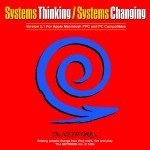Simulations
Leadingware specializes in the design of computer simulations for use in leadership development. These computer simulations blend innovative technology, problem-based learning, and research-based knowledge of effective leadership practice. The simulations are engaging and well-tested in university courses and executive development around the world.
As noted below in greater detail, selected simulations have been adapted for use in Asian countries. Adaptation includes revisions to make them suitable to the process of leading change in Asian organizations as well as translation. Current translations include Thai, Malay, and Korean.
For more information email to pjh@leadingware.com or hallinger@gmail.com. Free downloads of demo programs are available through the links below or for online purchase click here
Making Change Happen
Making change happen is an interactive computer simulation designed to teach key lessons on leading organizational change. The simulation comes in several versions including a focus on change in schools as well as in private sector organizations. The simulation has also been adapted extensively for use in Asian organizations based on research on change in Asian companies.
 The simulation places the learners (the simulation is typically played in teams) in the role of a project management team charged with implementing new IT systems in a company. The school version focuses on implementing new learning technology. The team has a budget to spend on activities designed to inform, interest, enable and support the staff in learning to use the new technology in the organization. Progress is made in the use of the new IT by 24 staff members through the stages of change. The simulation is played over a three-year period of time at which point the effectiveness of the team’s strategy is evaluated based on a combination of the number of “routine users” of the new IT and increases in productivity.
The simulation places the learners (the simulation is typically played in teams) in the role of a project management team charged with implementing new IT systems in a company. The school version focuses on implementing new learning technology. The team has a budget to spend on activities designed to inform, interest, enable and support the staff in learning to use the new technology in the organization. Progress is made in the use of the new IT by 24 staff members through the stages of change. The simulation is played over a three-year period of time at which point the effectiveness of the team’s strategy is evaluated based on a combination of the number of “routine users” of the new IT and increases in productivity.
The simulation is problem-based — the problem is presented first and the learners engage in attempting to solve it. Through the simulation experience, key lessons about leadership, change management, resistance, and change strategy are illustrated. Embedded in the simulation are a variety of change theories and models such as Roger’s Adopter Types, Kotter’s 8 stages, and Hall’s CBAM approach. However, these theories are only highlighted by the instructor after the simulation has been played.
The simulations are designed to be used first in an instructional setting. They are not intended as stand-alone products. For more information email to pjh@leadingware.comor for online purchase click here. When purchased, each simulation is packaged with:
-
a complete instructor’s manual
- an MS PowerPoint presentation
- workshop handouts.
 Making Change Happen US School version (English) Download
Making Change Happen US School version (English) Download Making Change Happen Business version (English) Download
Making Change Happen Business version (English) Download Making Change Happen Thai School version (Thai) Download
Making Change Happen Thai School version (Thai) Download
Support Materials for Use with the Systems Thinking Simulation
- Sample Making Change Happen PowerPoint handout Download
- Case problem for Making Change Simulation Download
- Activity Handouts Download
-
 Hallinger, P. Leading organizational change. In Hallinger, P., & Bridges, E. (2007). Problem-based management education: Developing “managers for action.” Dordrecht, Netherlands: Springer. Download
Hallinger, P. Leading organizational change. In Hallinger, P., & Bridges, E. (2007). Problem-based management education: Developing “managers for action.” Dordrecht, Netherlands: Springer. Download  Learning to Lead Global Changes in Local Cultures: Designing a Computer-based Simulation for Thai School Leaders. Hallinger & Kantamara (2001), Journal of Educational Administration. Download
Learning to Lead Global Changes in Local Cultures: Designing a Computer-based Simulation for Thai School Leaders. Hallinger & Kantamara (2001), Journal of Educational Administration. Download Hallinger, P., Crandall, D., & Ng Foo Seong, D. (2001). Making change happen: A simulation for learning to lead change. The Learning Organization. Download
Hallinger, P., Crandall, D., & Ng Foo Seong, D. (2001). Making change happen: A simulation for learning to lead change. The Learning Organization. Download
Systems Thinking/Systems Changing
 The simulations are designed to be used first in an instructional setting. They are not intended as stand-alone products. When purchased, each simulation is packaged with:
The simulations are designed to be used first in an instructional setting. They are not intended as stand-alone products. When purchased, each simulation is packaged with:-
a complete instructor’s manual
- an MS PowerPoint presentation
- workshop handouts.
The demos below do not, therefore, represent the complete product. For more information email to hallinger@gmail.com or for online purchase click here
 Systems Thinking/Systems Changing US School Download
Systems Thinking/Systems Changing US School Download Systems Thinking/Systems Changing Business (English) Download
Systems Thinking/Systems Changing Business (English) Download
- Sample PowerPoint handout Download
- Case problem for Systems Thinking Simulation Download
- Activity Handouts Download
-
 Hallinger, P., Crandall, D., Ng Foo Seong, D. (2000). Systems thinking/Systems changing: A Computer simulation for learning how to maker schools smarter (pp. 141-162). In K. Leithwood and K.S. Louis (Eds.) Understanding schools as intelligent systems. New York: JAI Press. Download
Hallinger, P., Crandall, D., Ng Foo Seong, D. (2000). Systems thinking/Systems changing: A Computer simulation for learning how to maker schools smarter (pp. 141-162). In K. Leithwood and K.S. Louis (Eds.) Understanding schools as intelligent systems. New York: JAI Press. Download -
 Hallinger, P. (1998). Increasing the organizational IQ: Public sector leadership in Southeast Asia. The Learning Organization, 5(4), 176-183. Download
Hallinger, P. (1998). Increasing the organizational IQ: Public sector leadership in Southeast Asia. The Learning Organization, 5(4), 176-183. Download
Improving School Success (formerly known as ITCOT)
 Improving School Success is designed to place a knowledge base of information on factors that contribute to effective school learning at the fingertips of school leaders. based on an extensive review of research, this problem-based simulation places the school leader in the position of a principal or school leadership team seeking to improve learning and teaching. The learner has a budget to spend on an improvement strategy that draws from 50 different research-based interventions aimed at improving student achievement in the school.
Improving School Success is designed to place a knowledge base of information on factors that contribute to effective school learning at the fingertips of school leaders. based on an extensive review of research, this problem-based simulation places the school leader in the position of a principal or school leadership team seeking to improve learning and teaching. The learner has a budget to spend on an improvement strategy that draws from 50 different research-based interventions aimed at improving student achievement in the school.
Underlying the action-oriented approach to school improvement is a theory of organizational change. The learners must not only draw apply research-based interventions, but also do so in a way that is validated by empirical studies of change and school improvement.
The simulation is designed to be used first in an instructional setting. They are not intended as stand-alone products. The demos below do not, therefore, represent the complete product. For more information email to hallinger@gmail.com or for online purchase click here. When purchased, each simulation is packaged with:
-
a complete instructor’s manual
- an MS PowerPoint presentation
- workshop handouts.
Download Demo
 Improving School Success Download
Improving School Success Download
- Sample ISS PowerPoint handout Download
Papers on Improving School Success
 Hallinger, P. & McCary, M. (1991). Using a problem-based approach to instructional leadership development. Journal of Staff Development, 12(2), 6-12.
Hallinger, P. & McCary, M. (1991). Using a problem-based approach to instructional leadership development. Journal of Staff Development, 12(2), 6-12. Hallinger, P. & McCary, M. (1990). Developing the strategic thinking of instructional leaders. Elementary School Journal, 91(2), 90-108. Download
Hallinger, P. & McCary, M. (1990). Developing the strategic thinking of instructional leaders. Elementary School Journal, 91(2), 90-108. Download
